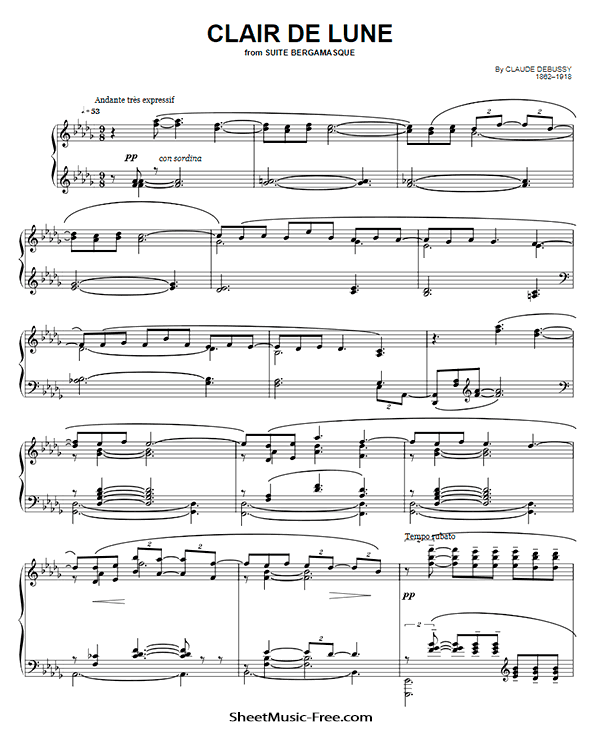from the Piano Sheet Music Index
Clair de lune, (translation: “moonlight”) is the third movement from the Suite bergamasque by French composer Claude Debussy. It has been featured in many films for its beautiful, emotive quality. Clair de lune means moonlight and almost all parts are played by pianissimo. This work was written with a poem by Paul Verlaine of the same name. Recently, Clair de lune became one of the music soundtracks from the big screen film, Twilight. Clair de Lune is one of the famous works by Claude Debussy. Created around 1890 and published in 1905. 'Clair de lune' (English 'Moonlight') is a poem written by French poet Paul Verlaine in 1869. It is the inspiration for the third and most famous movement of Claude Debussy's 1890 Suite bergamasque. Debussy also made two settings of the poem for voice and piano accompaniment.
$2.69 | Unlimited Digital Downloads
Clair de Lune (Debussy) | Easy Piano Sheet Music

Format: PDF/Digital Print
Pages: 1
Product Description
Our Meet the Composer graded piano solos are written to give students the best chance for success while maintaining the integrity of the original work. Permission granted for instruction, public performance, or just for fun.
Contents
'Clair de Lune' from Suite Bergamasque (Abridged) by Claude Debussy for Easy/Level 5 Piano Solo (1 Page)
Best Sellers for Beginner and Easy Piano Sheet Music
MMF Print. Get Unlimited Music Lesson Resource Downloads and Save - $36/Year
Try the Online Piano Lessons Kids LOVE... for FREE!
Music Flashcards | Treble Clef Note Names
MMF! All-In-One Piano Primer Book for the Young Beginner
MMF! All-In-One Piano Book, Level 1A
New Products for Beginner and Easy Piano Sheet Music
MMF All-In-One Piano Lesson Book, Level 1B
Symphony No. 5 in C Minor (Beethoven) - 1st Mvt | Easy Piano Sheet Music
Piano Bump | 3-in-1 Skill Building Game for Kids
Beethoven at Bat™ Music Composer Game (2-6)
Maple Leaf Rag (Joplin) | Easy Piano Sheet Music - Play and Learn™ Edition
Product License

Unlimited copies for you and your students. However, you may not distribute additional copies to friends and fellow teachers.

About the Composer of 'Clair de Lune' from Suite Bergamasque

Clair De Lune Free Download
Claude Debussy was born in Saint-Germain-en-Laye, France, on August 22, 1862. He was the oldest of five children. His father, owned a china and crockery shop, and his mother, Victorine Manoury Debussy, was a seamstress. Claude began piano lessons at the age of seven with an Italian violinist named Cerrito. His musical talent was quite evident, and by the age of ten Claude began studying music at the Paris Conservatoire. During his time there he studied composition, music history, piano, organ, and solfége. His experimental approach to composing music was problematic to his teachers however, as he did not like following the strict rules of the Conservatory. Read more...